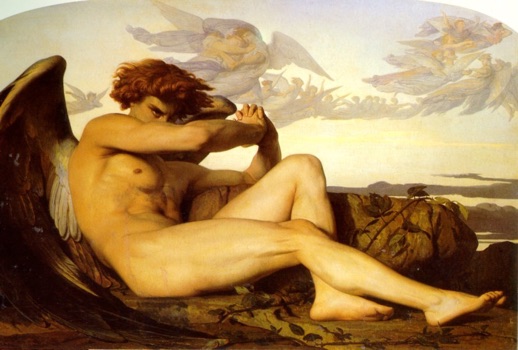
The first chapter of the continuing saga of Evan Ingersoll, opera-loving bar-back.
Weekends at Aura Bar on 53rd and Ninth are typically big money makers for the morons who run the place. Jonjon and Yoni—preferred portmanteau: “Yawnyawn”—are a couple of scissorbills from Tel Aviv or France or wherever; they aways bring in the best of the Hell’s Kitchen Knuckle-Draggers. But this past Saturday, the place was deserted. A recent gun scare in Midtown (just in time for New Year’s!) left three of the joint’s shirtless bartenders picking nervously at their jockstraps in the bar’s back room.
Meanwhile, a lone, confetti-dusted bar-back was off in his own corner of the office, with only a vague sense of the panic afoot. No, too hard at work was he, proofing his own fan letter to Angela Meade for typos. Having just seen her before Christmas at the Met in McVicar’s dimly-lit, roundhouse-garrisoned Norma, he still felt buzzy about her performance.
What a stupid-awesome voice, he thought, recalling how secure and warm-toned she sounded at the top of her range. He had visions of what his fan note might accomplish: earn him a new pen pal at the Met? Compel Meade to finally appear in his fantasy football production of Cunning Little Vixen?
Or, even if only briefly, might his letter serve to uncross those great, astigmatic, lavender-shadowed eyes of hers?
At 29, Evan Ingersoll was the type of queen who didn’t know a whole lot beyond his appreciation for certain singers. And even then, much of his taste in opera had been cultivated through the scrim of recorded sound.
A generational thing, perhaps. Or maybe something to do with the fact that he’d been raised a dilettante in the seaside enclave of Provincetown—great for gays, wind chimes, AA meetings, and lobster bisque; sub-optimal for regular, firsthand parterre experience.
Via recordings, he’d gone through a litany of phases with various repertoire, never alighting for too long on any one genre, era, conductor, or singer.
There were the sentimental LPs he’d received early on from Nana Cloris: a wash of bottled-up, histrionic Callas/Di Stefano gems, Sicilian fish vendor renditions of Minnie and Cio-Cio courtesy Renata Tebaldi, and a De Los Angeles “Shéhérazade” that seemed to have been captured on a respirator. All these he instinctively appreciated while still in fourth grade.
There were the operettas he’d prized in middle school: Fledermaus, Lustige Witwe, Patience, Porgy and Bess, Show Boat (his favorite, due in no small part to a winning Broadway revival album starring Sparkle’s Lonette McKee).
Then there were recorded classics he’d unearthed at Siren’s Sounds, the used record shop in Yarmouth, and cherished throughout his teenage years. These ranged rather eclectically from Khaikan’s Onegin to Klemperer’s Zauberflöte to the Barbirolli Butterfly to a great, lesbionic Fritz Reiner/Inge Borkh collection of Strauss arias. (No one barks “Allein…” quite like Borkh. No one.)
Before he dropped out of college, Evan had already added a fairly extensive list of lady singers to his menagerie, of all nationalities and fachs.
He had his dalliance with early soubrettes—Sena Jurinac, Bidu Sayao, Rita Streich—and then spent months selecting his favorite Salome: Welitsch, Nilsson, Malfitano, Cebotari. He followed this up with coloraturas who could run for the hills, a melismatic, hard-jawed, thin-lipped roll call that included early Sutherland, Anderson, Bartoli, Gruberova (sometimes), and Horne.
Then he got dumped and had a three-month moment with old Kirov recordings and Mahalia Jackson.
His preferred voices, he’d learned in his early twenties, tended to be either creamy and lusty or pointy and cerebral. He had little interest in theatrics, or in acting, because, well, he frankly didn’t care for what he couldn’t see.
“Ey papi,” said Pierre, an Ecuadorian stripper, cutting in on the exposition. “W’chu mind mooving yor nalgona and helping mi with these bloo boys?” He thrust a rickety tray of shots at Evan.
“Go fuck yourself, Pierre.” He took the tray.
Pierre shrugged, pivoted on his harness boot, and slunk out of the office.
Evan was, like many gay tadpoles raised under the same set of pre-simulcast conditions, essentially an audiophile, blind to the numinous impact of live performance. And like many gay audiophiles of his cohort, he was amazed to discover two conflicting truths when he moved to New York last year.
On the one hand, duh: visuality was a boon to his experience, enhancing his ability to see firsthand who could act, who could direct, what “inhabiting a character” could look like, what “Regie” meant, and what distinguished one production from another, at least beyond the marquis.
But he was also unhappy to find that audio recording scaled peaks that live performances could never attain. This was the logic of opera in an age of late capitalism, the repetitive allure of purchasable albums, with their dream casts and “best takes.” By contrast, with its attendant orchestra of coughs, sighs, and occasional snores, live opera was always already a letdown, a Paris Syndrome, like opening a door and spotting a trick without benefit of Facetune.
This, he felt, was the truth opera companies (all of them eager to turn a profit) didn’t seem to understand about the contemporary, market-savvy litter of opera queens Evan belonged to. Securing a queer audience in an audiophilic age isn’t just about finding identificatory divas for the closeted queen, as Koestenbaum might would have it.
Reared on records, today’s homos expected something else: a mimetic perfection that could only be realized as a sequela to the inevitable epiphanic realization that one could replay (and thus find hidden gems within) the same performance, again and again and again.
Ugh, Evan chided himself. If there’s one thing Angela Meade doesn’t want to read, it’s pastiche McCourt.
It was deep winter when Evan reached New York last year. He knew no one. Back in Provincetown he wasn’t terribly good at anything beyond removing his shirt to ur-anthems like “Dark Lady” and “Ring My Bell.” Genes had bestowed a great chest that worked for him, though. Aura was the first place that hired him.
Balancing his plate of blue boys, he stepped out of the office and swanned into the atrium. It was a pathetic crew seated at the bar, and Evan recognized everyone in sight.
Everyone…. except some dude in a green plaid shirt he’d never seen before.



